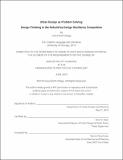Urban design as problem solving : design thinking in the rebuild by design resiliency competition
Author(s)
Elliott-Ortega, Kara
DownloadFull printable version (7.091Mb)
Other Contributors
Massachusetts Institute of Technology. Department of Urban Studies and Planning.
Advisor
Brent D. Ryan.
Terms of use
Metadata
Show full item recordAbstract
Following Hurricane Sandy in 2012, federal, state, and local governments initiated a series of disaster relief and recovery programs. These efforts were criticized for their lack of coordination, and fueled the public opinion that not only were coastal cities increasingly at risk for storm events due to climate change, but also that the government is not equipped to adequately respond to or prevent future disasters. The Rebuild by Design urban design competition was the first implemented recommendation of the cabinet-level Hurricane Sandy Rebuilding Task Force, and the main goal for the competition was the procurement of innovative resiliency projects for the areas affected by Hurricane Sandy. Sponsored by the U.S. Department of Housing and Urban Development (HUD), the competition is an unprecedented use of urban design by the federal government, leading to the question of why HUD would turn to an urban design process in the midst of other recovery efforts. Through interviews with designers from the winning design teams, this thesis finds that design thinking, under-examined by the participants, management, and evaluations of the competition, is the underlying theory that explains the benefits of an urban design process in the context of responding to climate change. Design thinking theorizes design as an alternative decision making process that can address complex problems for which there is no correct solution. This leads to the use of design as a method of creative problem solving as well as a catalyst for organizational change. This thesis finds that the competition design teams practice characteristics of design thinking. The resulting design ideas synthesize across regional, social, and economic systems, and offer an improved approach to the current infrastructure practices of flood protection and water mitigation. At the same time, the ability of the design process to fulfill the organizational goals of the competition, such as capacity building for local governments, remains mixed. Finally, this thesis generates recommendations for future iterations of Rebuild by Design as well as cautionary lessons for designers in light of the politics of relying on design as a form of innovation.
Description
Thesis: M.C.P., Massachusetts Institute of Technology, Department of Urban Studies and Planning, 2015. This electronic version was submitted by the student author. The certified thesis is available in the Institute Archives and Special Collections. Cataloged from student-submitted PDF version of thesis. Includes bibliographical references (pages 124-129).
Date issued
2015Department
Massachusetts Institute of Technology. Department of Urban Studies and PlanningPublisher
Massachusetts Institute of Technology
Keywords
Urban Studies and Planning.